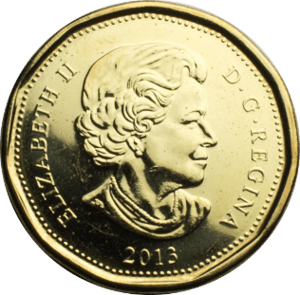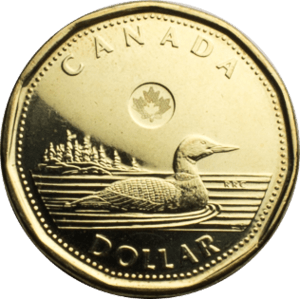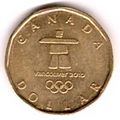Loonie facts for kids
| Canada | |
| Value | 1 CAD |
|---|---|
| Mass | 6.27 g |
| Diameter | 26.5 mm |
| Thickness | 1.95 mm |
| Edge | Eleven-sided, smooth, 7.5 mm |
| Composition | 1987–2011 91.5% Ni, 8.5% bronze plating (88% Cu, 12% Sn) 2007–2011 some coins used brass plating instead 2012–present steel, brass plating |
| Years of minting | 1987–present |
| Catalog number | – |
| Obverse | |
 |
|
| Design | Elizabeth II, Her Majesty the Queen in Right of Canada |
| Designer | Susanna Blunt |
| Design date | 2003 |
| Reverse | |
| Design | Common loon in water |
| Designer | Robert-Ralph Carmichael |
| Design date | 1987 |
| Design discontinued | 2012 |
 |
|
| Design | Common loon in water |
| Designer | Robert-Ralph Carmichael |
| Design date | 2012 |
The loonie (called huard in French) is Canada's one-dollar coin. It has a gold colour and was first made in 1987. The Royal Canadian Mint produces these coins in Winnipeg.
Most loonie coins show a common loon bird on one side. This bird is found all over Canada. The other side of the coin features Queen Elizabeth II, who was Canada's head of state. Over the years, some special loonies have been made with different designs.
What Makes the Loonie Special?
The loonie is not perfectly round. It has 11 sides, making it an 11-sided shape. This special shape is called a Reuleaux polygon. The coin is 26.5 mm wide and 1.95 mm thick.
When the loonie was first made, its size and 11 sides were similar to the Susan B. Anthony dollar coin in the United States. However, the loonie's gold colour was different from the silver Anthony dollar. Later US dollar coins, like the Sacagawea and Presidential dollars, also had a gold colour like the loonie. Other countries also use coins that are not perfectly round. For example, the British 20 pence and 50 pence coins have 7 sides.
How the Loonie Got Its Name
Soon after it was introduced, people started calling the Canadian one-dollar coin the "loonie." This nickname became very popular because of the loon bird on the coin. It became so well-known that the Royal Canadian Mint officially protected the name in 2006.
The word "loonie" is often used to talk about the value of the Canadian dollar. For example, news reports might say how the "loonie" is doing against other currencies. When Canada introduced its two-dollar coin in 1996, it was nicknamed the "toonie." This name combines "two" with "loonie."
Images for kids
-
The Big Loonie in Echo Bay, Ontario.
 | Emma Amos |
 | Edward Mitchell Bannister |
 | Larry D. Alexander |
 | Ernie Barnes |



